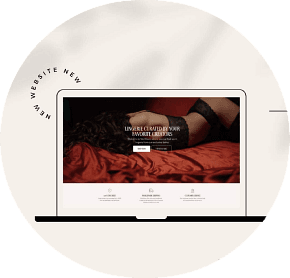In today’s digital age, having an online presence is no longer optional for small business owners. It’s essential. A well-designed website is your virtual storefront, a place where potential customers can learn about your products or services, connect with your brand, and decide if you’re the right fit for their needs. But why is web design specifically so important, and how can it impact the success of a small business? Let’s explore.
Hi, I’m Karina, the founder of Design by Karina , where I help small businesses build beautiful, user-friendly websites that drive results. I’ve worked with entrepreneurs from various industries, and one thing I’ve seen time and time again is how transformative a well-designed website can be. Whether you’re just starting out or looking to take your business to the next level, having a professional website is no longer optional—it’s essential.
In this post, I’ll share why having a website is so important for small business owners and how good web design can make all the difference in standing out, building trust, and driving growth. Let’s dive in!

First Impressions Matter
When a visitor lands on your website, the first few seconds are critical. According to studies, it takes about 50 milliseconds (0.05 seconds) for users to form an opinion about your website. This initial impression often determines whether they stay and explore or leave to check out your competitors. A poorly designed, outdated, or cluttered website can make your business appear untrustworthy, while a sleek, modern, and user-friendly site builds credibility instantly.
For small business owners, establishing trust is key to competing with larger companies. Web design plays a crucial role in achieving this. High-quality visuals, easy navigation, and responsive layouts help ensure visitors feel confident about engaging with your brand.
Your Website Is Your Business Card
Think of your website as your digital business card. While physical business cards can easily be forgotten or misplaced, a website is available 24/7. It provides a central location for potential clients to learn about your offerings at their convenience. Without a professional website, your business risks missing out on countless opportunities.
Boosting Credibility and Professionalism
According to research, 84% of today’s consumers think a website makes a business more credible than just relying on social media. Although platforms like Instagram and Facebook are great for connecting with audiences, they shouldn’t replace a website. Social media lacks the depth and control a custom-built site provides.
A professionally designed website demonstrates that you’re serious about your business. It also gives you the opportunity to showcase customer reviews, certifications, or industry awards, further solidifying your reputation.
Improved User Experience Leads to Better Results
Web design is about more than just aesthetics. It’s also about functionality and user experience (UX). If your website is slow, difficult to navigate, or not mobile-friendly, you’ll likely lose potential customers. In fact, 53% of mobile users will leave a website if it takes longer than three seconds to load.
Great web design ensures your site is easy to use on all devices. From smartphones to tablets, responsive design allows your website to adapt seamlessly, creating a positive experience for every visitor. This not only keeps users engaged but also improves search engine rankings, as Google prioritizes mobile-friendly websites.
Search Engine Optimization (SEO) and Visibility
Speaking of search engines, a well-designed website can significantly impact your visibility online. Modern web design integrates SEO best practices, such as:
- Fast loading times
- Properly structured HTML and metadata
- Mobile responsiveness
- Quality content organization
These elements help your site rank higher on Google and other search engines, making it easier for potential customers to find you. For small business owners with limited marketing budgets, SEO is a cost-effective way to attract organic traffic.
Staying Competitive
Your competitors are likely investing in web design. If you don’t, you risk falling behind. A lack of online presence, or a poorly designed website, can make it seem like your business isn’t keeping up with modern trends. This perception can discourage potential customers from choosing your services.
By prioritizing web design, you show your audience that you care about their experience and are willing to invest in your business’s growth.

Showcasing Your Brand Identity
Your website is the ultimate platform to express your brand identity. Everything from your logo, color scheme, typography, and imagery contributes to how your business is perceived. A cohesive and attractive design not only makes your site memorable but also helps differentiate your business from competitors.
For small business owners, it’s especially important to make your brand stand out. Web design allows you to communicate your unique selling points (USPs) in a way that resonates with your target audience.
Driving Conversions
The ultimate goal of any business website is to convert visitors into customers. A well-designed site guides users through the buyer’s journey seamlessly, encouraging them to take desired actions like making a purchase, booking a service, or contacting you for more information.
Key design elements that drive conversions include:
- Clear calls-to-action (CTAs)
- Easy to find contact information
- Engaging visuals and copy
- A secure checkout process for e-commerce sites
When done correctly, web design can turn casual visitors into loyal customers, making it an invaluable tool for growth.
Cost-Effective Marketing
Traditional advertising methods like print ads or billboards can be costly and difficult to measure. A website, on the other hand, is a more affordable and trackable marketing tool. With analytics, you can see how users interact with your site, which pages they visit, and what content drives the most engagement.
This data allows you to refine your strategies, ensuring your marketing budget is spent effectively. Web design also supports other digital marketing efforts, such as email campaigns and social media ads, by providing a landing place for these activities.
Adapting to Consumer Expectations
Today’s consumers expect businesses to have an online presence. If they can’t find you online, they might assume you’re not legitimate or aren’t keeping up with the times. A professional website shows you understand and cater to their needs, enhancing your credibility and appeal.
Conclusion
Investing in web design is one of the smartest moves a small business owner can make. It’s not just about having an online presence—it’s about creating a strong, positive impression that drives growth, builds trust, and sets you apart from competitors. Whether you’re just starting out or looking to refresh an outdated site, prioritizing web design will pay off in the long run.
Ready to take your small business to the next level? Start with a professionally designed website, and watch your opportunities grow.

